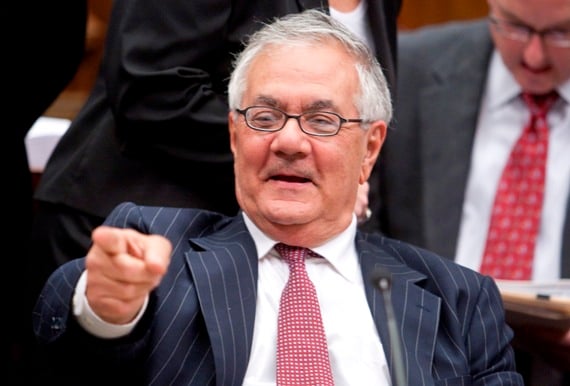Law's co-author comfortable with postponement of deadlines — if agencies need more time to gather info
Officials at federal agencies scrambling to translate the sweeping Dodd-Frank financial reform law into regulations can breathe a little easier if they fall behind – as many of them have.
Hundreds of provisions in the measure must be implemented by July 21, the one-year anniversary of its enactment. But one of the law's authors, Rep. Barney Frank, D-Mass., told a group of lawyers today that no deadline in the law is actually drop-dead.
“There is no penalty for not meeting the deadline,” Mr. Frank said during a webinar sponsored by the National LGBT Bar Association. “There's no gun at their heads. Nobody gets fired.”
In fact, Mr. Frank, the ranking Democrat on the House Financial Services Committee, indicated that he's comfortable with agencies pushing back the implementation of some provisions if they need more time to sift through comments and propose rules.
The Securities and Exchange Commission, which is responsible for implementing more than 100 Dodd-Frank provisions, is likely to delay until the first quarter of 2012 a rule that would require investment advisers with $25 million to $100 million in assets under management to switch their registration from the SEC to their states.
That switch was to happen by July 21. In early April, however, the agency said that it would not have the Investment Advisor Registration Depository system reprogrammed and ready to accept transition filings in time.
The SEC anticipates promulgating the regulation that governs the switch by July 21. But advisers will have a grace period until 2012 to sign up with state regulators before withdrawing their SEC registration.
Although Mr. Frank didn't address the adviser switch in his remarks, this is the type of timeline adjustment that he would accommodate.
But he opposes a bill recently introduced by Republicans on the House Financial Services Committee that would delay implementation of Dodd-Frank derivatives provisions until December 2012.
The GOP members said that the legislation would give regulators more time to meet the objectives of the derivatives title and to consider its costs, benefits and effects on the market.
Mr. Frank said that the Republicans are trying to stall the derivatives piece until after the 2012 election in the hope that a GOP president and Senate majority would scuttle the provisions.
“I think they're making a political and economic mistake,” said Mr. Frank, who touted the transparency that Dodd-Frank would bring to derivatives. “We think it forces changes that are overwhelmingly constructive.”
Republicans assert that the entire law — not just the derivatives section — is being implemented too quickly.
“At the current breakneck pace, it is difficult for individual firms — especially small businesses — and the public at large to meaningfully participate and offer their insights and observations,” Rep. Spencer Bachus, R-Ala., chairman of the House Financial Services Committee, said in a statement last week.
Mr. Frank is dismissive of criticisms of the Dodd-Frank implementation timeline.
“What you have is complaints from people who were against it in the first place,” Mr. Frank said.







